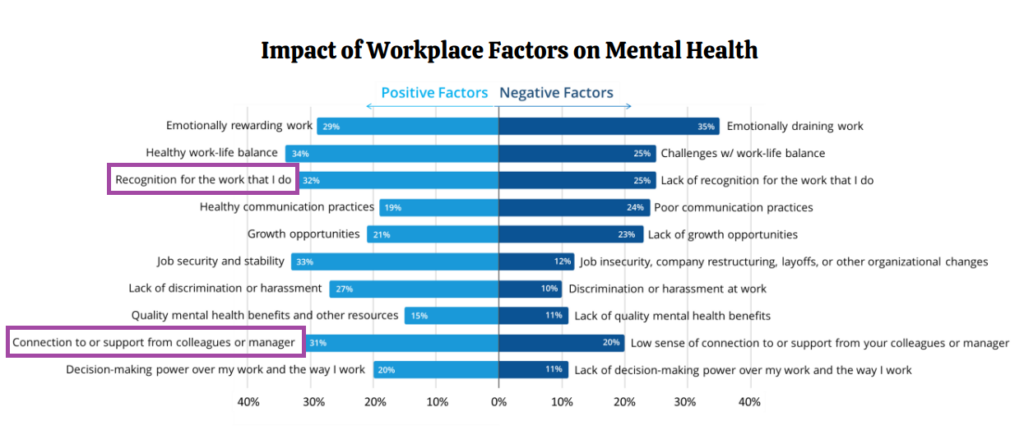Mentoring and improving mental health at work
The topic of mental health in the workplace is already beginning to make its way into everyday life in modern companies. This trend has intensified especially after the pandemic and in the wake of recent political and global events. In contrast, an issue still new for this moment, at least in Europe, is the impact that mentoring has on mental health. In this article, I will take a closer look at this by proving that mentoring can significantly improve satisfaction and overall “mental health” at work.
Mental health issues at work
As I mentioned in the introduction, research and government institutions, but also companies themselves, are slowly beginning to recognize the topic of mental health in the context of work. The most important development in recent years in this regard is probably the WHO’s inclusion of occupational burnout in the list of the International Classification of Diseases. As of January 1, 2022, burnout, which is directly related to mental health, is officially recognized as a syndrome that can lead to more serious health problems. This event has created a media buzz and brought attention to mental health issues at work.
But of course, this is not the only signal. Studies and reports on mental health at work have also begun to appear widely.
More than half of employees feel anxious, stressed and have a lowered mood at work
One example is a study performed by the HARMONIA Mental Health Clinic (LuxMed Group). According to it:
- As many as half of employees intensely feel stress at work,
- 60% have significantly lowered mood manifested by sadness and depression,
- 65% of those surveyed worry about their future feeling anxious even without stressful situations.
Interestingly, the greatest difficulties with health are reported by a group of younger people – under 30 years of age.
As a result of these problems, employees report lower motivation to work (57% have difficulty staying motivated) and lower productivity (65% of respondents).
2/3 of employees report symptoms of burnout
Similar conclusions can be drawn from a study commissioned by Nationale-Nederlanden. It shows that as many as 67% of employees experience symptoms ofwork burnout. Remote or hybrid workers are slightly more likely to report these symptoms (75% and 79%).
“Among the most frequently mentioned (symptoms) are work exhaustion, lack of pleasure from work or willingness to change it. These were indicated by 36 percent, 35 percent and 29 percent of people surveyed, respectively.”
Effects of mental health problems on employers
Of course, the direct effect of the aforementioned problems is on the overall well-being of employees, but also more broadly on us as people. Work is intertwined with personal life, and problems at work also directly affect personal life.
In addition, the unattended topic of mental health problems leads to much worse effects and diseases, for example, anxiety or depression.
As a result, the topic of mental health also directly affects entrepreneurs. According to Social Security Administration (ZUS) data, as many as 1.3 million sick leaves were issued for mental disorders in 2022, accounting for 10% of all incapacity-related absences.
Most often, these layoffs were related to:
- severe stress and adjustment disorders (32% of mental health-related absenteeism days),
- depressive episodes (20%),
- Anxiety disorders (18%).
The impact of mentoring on comfort and mental health
Of course, the safest way to take direct care of your mental health is to consult a specialist. If you have any worrisome symptoms it is always a good idea to consult a therapist. Many companies are already starting to include free consultations with a psychologist in their employee benefit programs. This is a very good trend and worth taking advantage of.
But improved well-being is also influenced by the situation itself and the mechanisms implemented in the workplace, including the proven impact on mental health that mentoring has.
In the industry, you can find many studies, case studies and meta-analyses showing how mentoring at work affects mental health. Below are some examples.
Improve self-esteem by building relationships
The first of the studies I would like to present is a program carried out in the Netherlands to test how mentoring affects relationship building and networking. This study revealed strong effects of mentoring toward improving self-esteem and reducing loneliness.
An established relationship based on appreciation and acceptance, and the successful process of entering this relationship itself, gave Mentees a sense of self-esteem, acceptance and confidence, and suggested that it would be easier to build further relationships in later life.
With that said, this study also showed the importance of Mentors understanding each other’s needs, as well as Mentees’ commitment and basic social skills.
The impact of mentoring on the mental well-being of students
The second study involved students at US universities and analyzed how mentoring reduces the negative effects of the Covid-19 pandemic on their mental health.
The study also shows that different groups of students reacted differently to mentoring, but all had noticeable positive effects in leveling negative emotions, improving mental health and academic performance.
Mentors also benefit from mentoring
As you can see, mentoring has a positive impact on Mentees’ mental health, which is not only evident from the very premise of mentoring, but has also been confirmed by concrete research. But what about Mentors and Mentees? Does mentoring also have a positive impact on the other side of the couples?
Yes. This is shown, among other things, by a study conducted on female police officers in the UK. According to it, participation in a formal mentoring program as a Mentor leads to lower stress and anxiety. In addition, Mentors through mentoring feel that their work is more valuable, which further improves their mental well-being.
Mentoring mechanisms to improve mental health of employees
Mentoring, through its assumptions, triggers a number of mechanisms and activities that in turn positively improve mental health at work. According to report by the Mind Share Partners organization, mental health is positively influenced by, among other things (ranked 3 and 4):
- Appreciation of the work being done,
- Contact with co-workers or manager,
- Support from co-workers or manager.

Source: https://www.mindsharepartners.org/mentalhealthatworkreport-2023-dl
Mentoring perfectly supports the aforementioned factors, but in addition, it provides many others that also positively affect the mental health of Mentees:
- Improving Confidence, Appreciating Work Results – Mentors working with Mentees are in direct contact with them. They give feedback and discuss the results of their mentoring work, so they notice this work directly and often appreciate whether it is the results or the Mentees’ own strengths and resources.
- Being listened to – Mentoring sessions are one-to-one, so during them the Mentee has a chance to speak up, and as long as the Mentor does not make basic mentoring mistakes – he/she is heard.
- Reduce Stress by Supporting Current Challenges – Mentors can offer their direct support in dealing with current problems and challenges at work. They can help the Mentee overcome them, and in some situations share their own experience or advise on specific solutions. This, in turn, can lead to lower stress directly related to these challenges.
- Better well-being through improved effectiveness at work – Mentoring is aimed at Mentee development, goal realization and self-improvement. This naturally leads to greater effectiveness of Mentees in a given area. And greater effectiveness, means better well-being.
- Building Relationships – mentoring in its premise is to build a relationship. Although, as one may assume, it is only one relationship – with the Mentor, it is of high quality and relatively constant throughout the mentoring process, and sometimes longer. This allows the Mentee, but also the Mentor, to feel less lonely, and as many studies show, relationships and networks of friends correlate perfectly with good mental health.
- Noticing More Serious Symptoms – Finally, it is worth noting one more area – less obvious, but extremely important. During mentoring sessions, the mentor enters into a relationship with the Mentee, gets to know the other person, his or her challenges, problems, but is also often able to spot more serious symptoms in time. An honest relationship can, for example, reveal signs of progressive depression or burnout, and this in turn provides an opportunity to respond – for example, by suggesting contact with a therapist.
See also other benefits that Mentoring has for companies, Mentors and Mentees.
Practical application of mentoring to improve mental health
As you can see, mentoring, by virtue of its premises, has many “built-in” mechanisms acting positively on well-being and mental health. These are “side effects” of mentoring, so to speak, and occur regardless of what the original purpose of implementing the mentoring program was.
Interestingly, however, according to research, some companies are deliberately introducing mentoring at their companies – precisely to improve well-being. This is shown, among other things, by a study conducted in 2021 on employees of US companies. In that study, respondents specifically cited mentoring as one of the forms of mental health support they use at their company. The full list of methods used to improve well-being by respondents included:
- Vacation: 21%
- Flexible working hours: 18%
- Psychological therapy during business hours: 16%
- Coaching or mentoring: 15%
- Reduction in the amount of work: 15%
- Regular meetings with your supervisor: 15%
How to start a mentoring program in a company?
The studies I have cited show that the topic of mental health in the workplace is extremely important and, in my opinion, will become increasingly important in the coming years. At the same time, one method worth using to improve well-being is mentoring.
However, mentoring is still an unpopular method of employee development in European companies, and many companies lack the knowledge and experience of how to carry out such a process. That is why we have created Mentiway – a tool dedicated to mentoring, enabling you to implement the program and lead it effectively with no prior experience. We invite you to contact us.
Hi, my name is Thomas. I am the Co-Founder of Mentiway. We are happy to share our knowledge and support organisations on their way to success! 💪 If you are interested in how to efficiently and effectively implement a mentoring programme in your organisation using technology:








